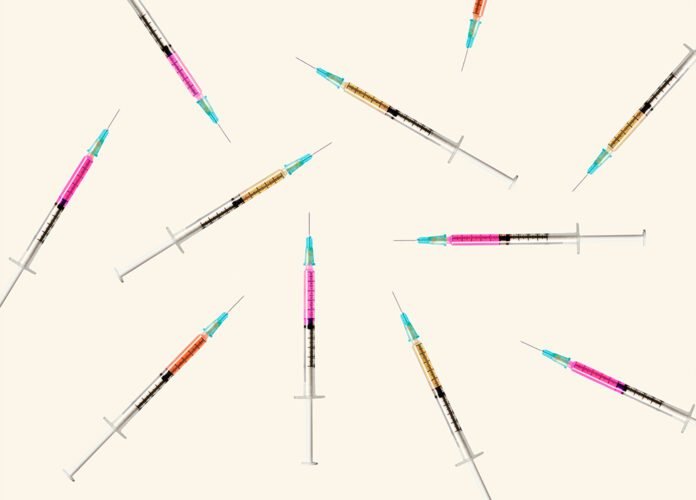While the FDA has been in the news for a handful of approvals over the past year-plus, New York dermatologist Bruce Katz, MD, and his colleagues, are “beyond excited” for the administration’s upcoming consent in the field of aesthetics.
Enter DAXI, a neuromodulator that Dr. Katz explains is “like Botox, except it lasts longer, with a time span averaging around 24 weeks.”
What it means: “Patients only need about two treatments per year to maintain their results,” he says.
While this latest, longer-lasting offering isn’t necessarily designed to replace other injectables, Dr. Katz gives it a thumb’s up mainly because it gives patients a “different option” when it comes to wrinkle-relaxers.
Boca Raton, FL oculoplastic surgeon Steven Fagien, MD, who was also involved with the DAXI trials, is on board with the innovation, too.
“Some of the most interesting things about DAXI comes back to the history and the performance,” he says, adding that the product was originally formulated to be a topical application (as in something you apply to the face, as opposed to injecting), but things didn’t go entirely as planned.
“The preliminary studies were not as impressive as they had hoped for, and the FDA urged the company to explore its use as an injectable.”
Fast forward to now: “The injectable had some very unique qualities, as I expected for any neurotoxin. The benefits are similar, but they are not necessarily the same,” says Dr. Fagien. “Botox, Xeomin, Jeuveau, Dysport all have similar effects, but it’s important for a consumer to understand that none of the products are entirely identical.”
As Dr. Fagien explains, this discrepancy does not relate to the units (“everyone talks about units and that they are not interchangeable, and this is true for all of the products”), but the actual performance, which is based on unique manufacturing, coupled with an experienced injector who knows how to use the drug.
“I have given many presentations on this to my peers, and DAXI seems to have a larger field of effect and, perhaps, in part (and this likely relates to its proprietary formulation), may explain why the drug is felt, by many, to last ‘longer,’ which is giving it its longer effect on-label.”
Beyond the prolonged time frame, Dr. Fagien says it has also become very apparent throughout his 36-plus years of experience using neurotoxins, that even the most experienced injectors have “been using injection paradigms that are not optimal and have been borrowed by the old, uninformed.” As in, “we had nothing prior to compare since it was the first one studied—way the original Botox FDA-trial was performed, and every neurotoxin since has used the same injection pattern. Optimal injection technique not only increases performance (longevity and results) but can more easily avoid adverse events, both cosmetic surprises and upper eyelid ptosis.”
As Spokane, WA dermatologist Wm. Philip Werschler, MD succinctly explains, the biggest difference with DAXI is based on the formula that includes an accessory protein, one that is also associated with the increased longevity, but “dosing equivalence vis-a-vis the other toxins hasn’t been established yet.”
“We do know from previous studies that there is a dose response curve with toxins, i.e. it has a bigger dose, so it will have a longer and more pronounced effect. However, it’s not a one-one-one ratio—meaning double dose doesn’t necessarily mean twice as long. We will need studies to determine that.”
“So, is the longevity because it’s a bigger dose equivalent?” Dr. Werschler asks. “You can’t compare unit to unit equivalence between toxins, they all have proprietary dosing units. We currently expect the label will have dosing for a 24-week effect. Could the same effect be achieved with a higher dose of one of the other toxins? Again, we will need studies.”
“After that, then it becomes a pricing game.”
Saddle Brook, NJ dermatologist Dr. Fredric Haberman is also excited about the new treatment, and says it has easily established itself as “the latest neuromodulator product to far surpass the result timeframe of all of the competing brands,” with the biggest difference being that it contains a proprietary peptide.
“DAXI is the latest neuromodulator product to far surpass the result timeframe of all of the competing brands, including Botox,” he says. “That means you would only need to undergo two injectable treatments in one year to maintain your results.”
Fort Lauderdale, FL dermatologist Dr. Matthew Elias is quick to stress that DAXI is very similar to existing neuromodulators like Botox and Dysport, but, similarly, calls out its major difference of the proprietary stabilizing peptide excipient.
“That, combined with the highly purified botulinum toxin, allows it to prolong the effect with results expected to last double the amount of existing products. Interestingly, there are quite a few new neuromodulator products in the pipeline so it’s an exciting time for patients and doctors who have some great new options to look forward to in 2022.”
West Palm Beach, FL dermatologist Ken Beer, MD was also a clinical investigator and, therefore, can’t reveal anything that is confidential, but shares that it’s important (and solidly scientific information) to know that DAXI has released two trials—one in the U.S., one in Canada—both of which showed impressive duration and what he refers to as “very precise placement.”
And, as far as any competition crowding the neurotoxin field, Dr. Beer contends it will only boost interest in injectables, fillers and a general interest in aesthetics, overall.
“I am really looking forward to having another product to offer patients and to have one that potentially will work for six months is exciting,” he says. “My sense is that more people are going to get treated, as they now have so many choices and options for duration. Either way, DAXI has been delayed in its FDA approval because of issues with manufacturing plant inspection secondary to COVID restrictions, but we can all look forward to full FDA-approval and market entry into the aesthetics marketplace soon.”
Find a Doctor
Find a NewBeauty “Top Beauty Doctor” Near you



